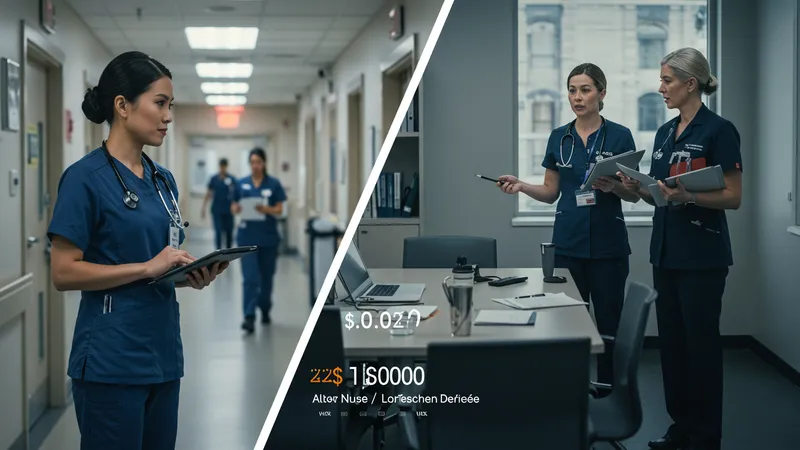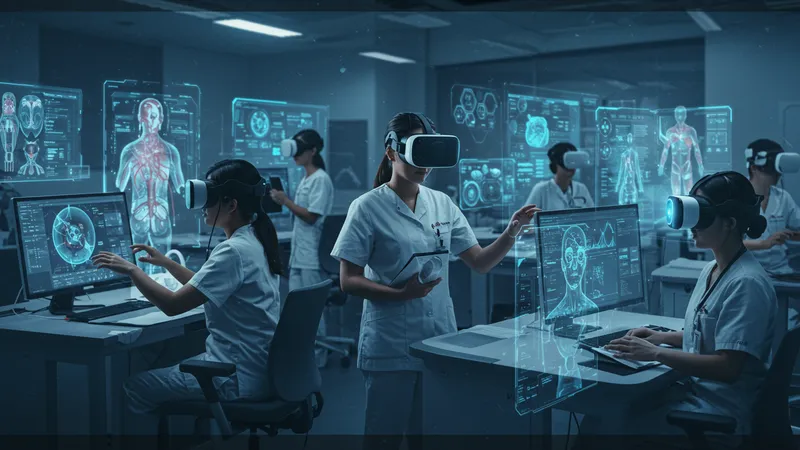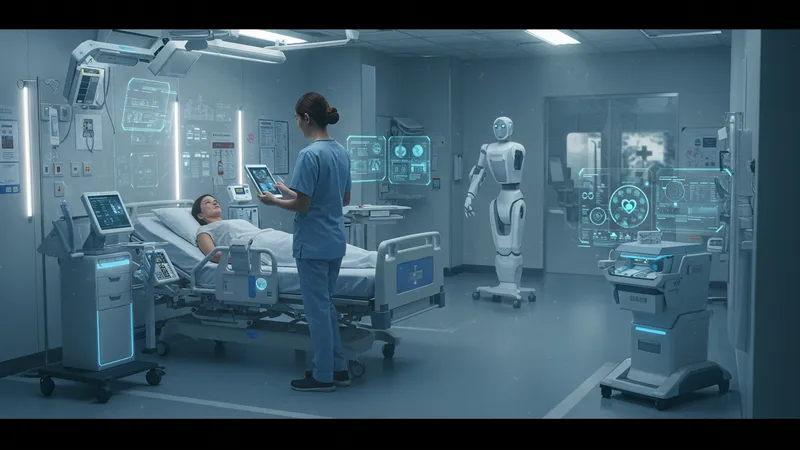Have you ever wondered why so many people are talking about nursing degrees right now? In a surprising twist, not all nursing degrees offer the same opportunities, and choosing the wrong one could set you back years in your career!
With a global healthcare transformation underway, understanding the nuances between nursing degrees is more crucial than ever. What you decide today could impact your future more than you could imagine.

Contrary to popular belief, not all nursing degrees are about bedside manners and basic patient care. Some focus on leadership in healthcare, providing a fast track to influential roles in hospitals. Yes, you can jumpstart a high-impact career with the right nursing degree. But that’s not even the wildest part…
What if I told you that some nursing degrees could lead to jobs that pay six figures while allowing you to work from home? It might sound implausible, but it's a reality for thousands who broke away from the traditional path. But that’s not even the wildest part…
Are you ready to uncover the secrets of choosing the right nursing degree, secrets that even seasoned advisors overlook? What happens next shocked even the experts…
Many believe a Bachelor of Science in Nursing (BSN) is just a piece of paper, but that's far from the truth. BSN degrees open doors to specialized fields like public health nursing, which not only boost job satisfaction but also the paycheck. A BSN degree holder earns an average of $79,000 per year, yet many overlook its potential due to the upfront cost. But there’s one more twist…

Did you know that holding a BSN paves the way for leadership roles within a hospital? Many BSN programs include courses on nursing management and ethics, equipping you with the skills to climb the ladder. As you navigate patient care, you're simultaneously building a case for a corner office. Sadly, not everyone leverages this power. But there’s more beneath the surface…
Over half of healthcare employers now mandate BSN degrees for entry-level positions. It’s not just about meeting qualifications; it’s about shaping a workforce ready to tackle evolving healthcare challenges. However, securing that BSN might just be the beginning. What you read next might change how you see this forever.
Despite the intense curriculum, BSN graduates often report higher job satisfaction and career mobility compared to their counterparts with diploma or associate degrees. This isn’t just about the paycheck—it’s about passion meeting purpose. But continue reading, and you'll see why this is only part of the story.
The choice between an Associate Degree in Nursing (ADN) and a Bachelor’s seems simple, but it's far more complex. While ADN programs are shorter and cheaper, they might limit your career growth in the long run. An ADN might get you a job quicker, but at what cost to future promotions? The real impact is sometimes staggering…

An ADN holder’s salary averages about $10,000 less annually compared to a BSN. It's a significant difference that compounds over a career, influencing life decisions from buying a home to retirement savings. The financial discrepancy is an eye-opener, but there's more to consider…
Then there’s the issue of job security and advancement. While ADNs are a cornerstone in practical settings, BSN-prepared nurses find themselves eligible for more diverse roles, including management and specialized fields. These opportunities arise not just because of qualification requirements but due to the shifting demands of healthcare systems. But the debate continues…
As surprising as it may be, some states are pushing for legislation to make BSN degrees the standard for entry-level nursing roles, sparking a conversation about equity and access to education. This shift could transform the nursing landscape entirely, and what you read next might surprise even seasoned professionals.
Online nursing programs have surged in popularity, offering flexibility for those juggling family or work. But did you know that some of these programs rival traditional colleges in quality? Institutions like UMass offer accredited online degrees that align with industry standards without uprooting your life.

These online options can dramatically reduce tuition and living costs, yet the question arises about hands-on experience rarely matched in an online setting. Many worry about the lack of real-world interaction, but technology is breaking boundaries. Virtual reality simulations are not just the future; they’re the present.
For students, the main draw may be the self-paced learning that online programs offer, enabling them to balance life’s demands while pursuing education. This flexibility is a game-changer, especially for working mothers looking to advance their careers without sacrificing family time. But there’s one more twist...
Accreditation remains a critical factor for online nursing programs; without it, students risk graduating with worthless degrees. The allure of convenience must be balanced with rigorous standards. What you read next might change how you see nursing education forever.
When people think of nursing, they often picture hospital wards and patient rounds. But the field of nursing holds niches that are stunningly diverse. Have you heard about forensic nursing, where nurses play crucial roles in crime scene investigations? This isn't your ordinary career path.

Then there’s nurse entrepreneurship—a realm where innovation meets care. Nurses are increasingly starting their own businesses, offering wellness services, consulting, even creating healthcare apps. This specialty is not just a backdoor into business—it’s a full-fledged profession now, with potential earnings far beyond typical nursing salaries.
If adventure calls, travel nursing might be the answer. Nurses can make $3,000 weekly while exploring new cities and cultures. It’s a lifestyle many dream of but few pursue. Yet, it comes with its complexities, oftentimes overlooked in the whirlwind of exciting travel tales.
Psychiatric nursing is another hidden gem. With the rising awareness of mental health, this specialization is more in demand than ever, providing impactful career opportunities that help transform lives. But there's one more specialization that could redefine what you think of nursing…
Travel nursing isn't just about seeing the world; it's about experiencing diverse healthcare systems and expanding your professional skillset. How does $80,000 a year sound, coupled with the thrill of new locations? Many don’t realize that relocation expenses are often covered!

The perks extend beyond paychecks. Travel nurses often receive free housing, health insurance, and even bonuses for working in hard-to-fill locations. This profession is a financial boon disguised as adventure, but there are challenges you might not expect…
The nomadic lifestyle suits some but can be a hurdle for those craving stability. Relationships and family time may suffer, making it an undertow in what seems like a perfect arrangement. Yet, the rewards are plenty, including the unique camaraderie found among fellow travel nurses.
For those passionate about variety and growth, travel nursing offers a chance to work in renowned hospitals and collect experiences that shape expert practitioners. But, what you learn on the next page might change your perception of this thrilling career.
Becoming a leader in nursing means so much more than obtaining a title. Leadership roles are about influencing patient care standards and driving innovations in nursing practices. However, these majesty roles are often misunderstood, bearing responsibilities few realize…

The path to leadership isn't simply paved with a degree. It demands a blend of clinical experience, managerial skills, and emotional intelligence. Hospitals looking for change-makers often promote from within, where experience outweighs any theoretical learning.
But did you know that many nurses shy away from leadership opportunities due to fear of losing the patient-care aspect they love? Innovative hospitals now encourage dual roles, blending leadership with direct patient interaction, reshaping the prospects of nursing careers. Still, the story unfolds with another shift…
Global nursing leadership summits highlight diverse leadership styles, each capable of transforming healthcare environments. Participants often realize the power of inspiration and collaboration, adding an unexpected human element to what might otherwise seem a clinical career move. What’s next might astound you.
Technology has revolutionized modern nursing, with smart devices and electronic health records transforming patient care. But beneath the surface, nurses find themselves adapting to roles as tech consultants. It’s an evolving, fascinating aspect of the role.

Robotics and AI are integrating into patient care, managing tasks like medication delivery and vital checks. This technological aid doesn’t replace nurses but enhances their ability to deliver complex care efficiently. But, as with any innovation, new challenges arise…
With technology comes data—and lots of it. Nurses are increasingly becoming adept at data analysis, using insights to inform patient care decisions. This evolving skill set adds layers to the traditional nursing role but simultaneously demands continuous learning.
Despite apprehension from traditionalists, technology is proving to be a nurse’s ally in delivering better care. But this technological journey is just beginning, and what you read next might alter your view on the future of nursing.
The stigma surrounding mental health is slowly eroding, and nurses are on the frontlines of this critical transition. But many aren’t aware of the unique role they play in mental healthcare settings, where empathy and expertise intertwine.

Psychiatric nurses possess specialized skills that allow them to handle cases involving psychotherapy, crisis intervention, and even pharmacological therapies. It’s a demanding field but one that nurses enter with a sense of purpose and fulfillment.
This specialization requires resilience and compassion, as patients often rely on nurses as their primary confidants during their mental health journey. While the challenges are vast, the impact is profound. But how do they cope in such high-pressure environments?
Nurses lead initiatives to reduce stigma and raise awareness, often molding public policies that support mental health in broader healthcare conversations. This vital role positions psychiatric nursing at the forefront of change, and what follows could redefine how mental health is perceived globally.
Nursing and entrepreneurship may seem worlds apart, yet they're more interconnected than you might think. Nurses are increasingly stepping into entrepreneurial roles, bringing healthcare innovations to life. Their clinical expertise and entrepreneurial flair create remarkable synergies.

Imagine managing your own healthcare practice, developing patient engagement apps, or expanding wellness services. Entrepreneurial nursing isn’t just a vision; it’s a fast-growing frontier. And the benefits can outweigh traditional roles in surprising ways…
Nurse entrepreneurs often enjoy flexible hours and have the autonomy to choose projects that align with personal values—a stark contrast to hospital shifts. However, this path isn’t without risks, requiring strategic thinking and resilience.
While some view it as a career detour, entrepreneurial nursing might just be the revolution healthcare needs, breaking molds and enhancing patient care nationwide. As you read on, you’ll see how this trend might even reshape industries beyond healthcare.
Nurse practitioners (NPs) are redefining healthcare delivery, capable of diagnosing and treating illnesses, often filling gaps in primary care. But what's it like to walk in their shoes every day? Their responsibilities are more diverse than you might expect.

An NP’s day includes patient assessments, developing treatment plans, and collaborating with specialists. They are the linchpin in community health settings and are found in various environments, including clinics, schools, and even correctional facilities.
Despite their advanced role, NPs often face challenges regarding scope-of-practice laws, restraining them from operating to their full potential in some regions. Yet, their impact remains undeniable. But it’s not just clinical work that defines their roles…
NPs proactively engage in research and community health education, connecting with patients as educators and advocates. This dual role not only enriches the profession but also threads a social element through modern healthcare. What you’ll read next could suggest even broader horizons.
Nursing is not confined to hospital settings. With the right education, nurses can explore diverse paths including academia, policy-making, and research. These arenas invite nurses to influence future generations and healthcare systems directly.

In academia, nurse educators shape the next cadre of healthcare professionals, nurturing expertise and critical thinking. This less-trodden path is fulfilling, yet challenging, demanding a dedication toward teaching and research.
For those with a political spark, nursing in policy-making can drive significant change. Collaborating with lawmakers, nurses wield substantial influence on public health reforms, yet such roles require tenacity and an ever-broadening knowledge.
Research allows nurses to pioneer new clinical methodologies and healthcare practices, contributing directly to advancements in the field. These varied roles are testament to nursing’s breadth, but the exploration doesn’t end here. What is possible beyond traditional boundaries might just astonish you.
As healthcare shifts towards preventive care and technology continues to evolve, the future of nursing will look vastly different. Did you know that employment for nurses is projected to grow 7% by 2030? Such a trajectory presents endless possibilities for aspiring nurses.

Interdisciplinary collaboration is becoming the norm, with nurses working alongside engineers, IT experts, and social workers to deliver holistic healthcare. This transformation isn’t just about cross-departmental insights; it promises a paradigm shift in care delivery.
Rural healthcare remains a focus, with nurses playing a pivotal role in bridging the gap. Telehealth is a burgeoning field, revealing new avenues and demanding skills that nursing education is quickly adapting to include. But there’s more stirring under the surface…
Community-centered initiatives, grassroots healthcare solutions, and global collaborations could redefine nursing practices worldwide, inviting innovations beyond borders. Prepare to discover why these developments hint at an exciting new dawn for healthcare.
The journey through the world of nursing degrees is as diverse as it is dynamic, and the choices you make can truly transform your career trajectory. Whether you’re drawn to high-flying travel nursing or groundbreaking nurse entrepreneurship, there’s a path for everyone in this field. So go ahead, seize the opportunity—your future in nursing awaits. Bookmark this article; share the insights with someone pondering the great possibilities in nursing!